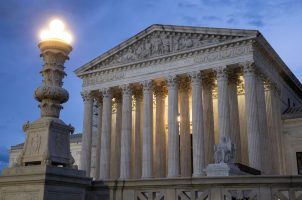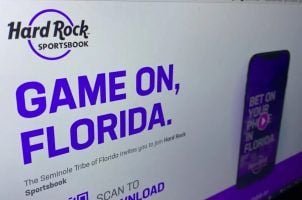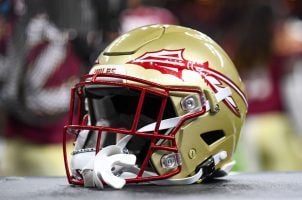US Supreme Court Denies Florida Sports Betting Case, Seminole Tribe Rejoices
Posted on: June 17, 2024, 12:44h.
Last updated on: June 17, 2024, 12:50h.
The United States Supreme Court on Monday announced it won’t accept an appeal of Florida’s decision to allow the Seminole Tribe to operate online sports betting through computer servers located on Native American sovereign land.

The nation’s highest court said the case challenging the US Department of the Interior’s 2021 approval of Florida’s new Class III tribal gaming compact with the Seminole Tribe had been rejected. Plaintiffs West Flagler Associates and the Bonita-Fort Myers Corporation alleged that the compact, which provides for the tribe to take remote online sports bets from anywhere inside the Sunshine State, violated the Indian Gaming Regulatory Act (IGRA).
The Seminole Tribe of Florida applauds today’s decision by the U.S. Supreme Court to decline consideration of the case involving the Tribe’s Gaming Compact with the State of Florida,” a Seminole statement read.
The tribe wasn’t named as a defendant in the case. Attorneys for the DOI defended that since the online sports bets are facilitated by computer servers remaining on sovereign territory, the compact doesn’t violate IGRA.
The online Hard Rock Bet sportsbook resumed operations on Nov. 7, 2023. Hard Rock Bet sportsbooks resumed their operations at the Seminoles’ six brick-and-mortar casinos in December.
Compact Prevails
Signed into law in October 1988 by President Ronald Reagan, the IGRA allows federally recognized tribes to conduct Class I and II gaming — bingo-based games and other small games of chance like pull-tabs and nonbanked card games like poker — on their sovereign lands. For Class III gaming like Las Vegas-style slot machines, live dealer table games, house-banked card games like blackjack, and sports betting, federally acknowledged tribes must enter into compacts with their host states.
Florida Gov. Ron DeSantis (R) and Seminole leaders reworked the tribe’s Class III gaming compact in 2021 to include retail and online sports betting, and new casino table games such as roulette and craps. In exchange, the Seminoles pledged to pay the state $2.5 billion over the first five years and an estimated $20 billion over the 30-year life of the agreement.
The online sports betting component was challenged by West Flagler and Bonita-Fort Myers, which runs the Bonita Springs Poker Room and previously the Magic City Casino in Miami. The Seminoles possess the exclusive rights to slot machines outside the counties of Miami-Dade and Broward.
The plaintiffs argued that allowing a person to bet on sports while not physically located on Seminole land violates the IGRA. Federal attorneys representing the Interior Dept. disagreed on claims the bet isn’t completed until a sportsbook computer server located on sovereign territory executes the wager. Therefore, no tribal gambling occurs off of the tribe’s reservation, the defendants wrote.
State Appeals Dismissed
West Flagler and Bonita-Fort Myers were also dealt a major legal blow last fall when the Florida Supreme Court refused to issue an injunction ordering Seminole sports betting to halt.
The state’s highest court said the plaintiff’s petition for a writ of quo warranto, or order for Florida to specify how it concluded that it has the authority to legalize online tribal sports betting, was not “the proper vehicle” in challenging the compact. The court therefore dismissed the case.
In that case, West Flagler/Bonita-Fort Myers challenged whether DeSantis and the Florida Legislature had the power to expand tribal gaming via online sports betting. The plaintiffs cited the 2018 statewide referendum Floridians passed that said any new form of commercial gambling must come with voter approval.
Related News Articles
Seminole Tribe Says Florida Cardroom Sports Betting Challenges Are ‘Strawmen’
Most Popular
FTC: Casino Resort Fees Must Be Included in Upfront Hotel Rates
Genovese Capo Sentenced for Illegal Gambling on Long Island
NBA Referees Expose Sports Betting Abuse Following Steve Kerr Meltdown
UPDATE: Former Resorts World & MGM Grand Prez Loses Gaming License
Most Commented
-
UPDATE: Whiskey Pete’s Casino Near Las Vegas Closes
— December 20, 2024 — 30 Comments -
Caesars Virginia in Danville Now Accepting Hotel Room Reservations
— November 27, 2024 — 9 Comments -
UPDATE: Former Resorts World & MGM Grand Prez Loses Gaming License
— December 19, 2024 — 8 Comments -
FTC: Casino Resort Fees Must Be Included in Upfront Hotel Rates
— December 17, 2024 — 7 Comments
















No comments yet